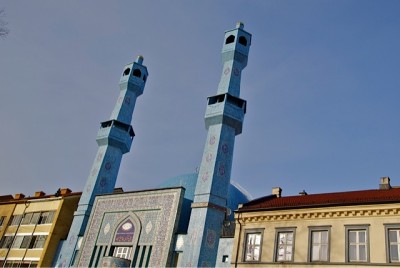Youthful rebellion and, paradoxically, a perceived need for stronger rules in Norway’s liberal society are believed to be behind a recent rise in the number of Norwegians converting to Islam. “I think we need stronger rules,” one young Norwegian convert told newspaper Aftenposten on Monday.

No one knows for certain how many “ethnic Norwegians” have converted to Islam, according to Aftenposten, but researchers believe their numbers have increased from around 500 at the end of the 1990s to around 3,000 today. That’s still a tiny percentage of the Norwegian population, but the growth rate is significant, as is the perceived reason behind it: “Converting to Islam is perhaps the most extreme form of youthful rebellion today,” Anne Sofie Roald, a professor in religion, told Aftenposten, which launched a series of reports over the weekend about Islam in Norway. Islam, Roald noted, is a religion that can require a lifestyle for converts that’s “extremely different from the life they’ve lived earlier.”
Setting limits
Roald, who converted herself more than 30 years ago, also cites the larger Muslim population now in Norway and its heightened visibility as factors influencing Norwegians who are looking for a religious alternative. She agrees with researcher Olav Elgvin of the University of Bergen that many converts also launch into their new lives as Muslims wholeheartedly. Some become radical extremists while others, such as Roald herself, later moderate the degree to which they practice their new faith.
“In general, many converts become ‘more Catholic than the pope,'” Roald told Aftenposten. She converted to Islam in 1982 and initially used a hijab but later stopped wearing it: “The reality can be that the ideas about limits set by religion can be more appealing than the limits themselves.” Like Elgvin, though, she thinks conservative Islam represents clear limits and a new form of security in a very free and liberal society like Norway’s, which can attract those rebelling a society where “almost anything goes.” The historic student protests of the 1960s led to social freedoms that now, perhaps, a new generation in rebelling against. That’s a paradox in a country that prides itself on its own hard-won freedom and independence, and its egalitarian society.
One 26-year-old Norwegian woman named Elsa, who didn’t want to be identified, told Aftenposten she’d fallen in with a “bad” group and abused both drugs and alcohol. She began to pray and then took Arabic language lessons, which gave her “a good gut feeling” about Islam. She began to read more, and said that what appealed to her most were the rules within Islam that were much stronger than in Norwegian society in general.
“I think people need that, guidelines and rules and consequences in the form of punishment or praise,” Elsa told Aftenposten. “Something to believe in.”
‘Religious experience’ on Utøya
Morten Ibrahim Abrahamsen, now a 23-year-old man from Hamar, converted after surviving the massacre of July 22, 2011 on the island of Utøya that was carried out by another young but right-wing anti-Islamic extremist. Abrahamsen told Aftenposten he had a religious experience while he desperately tried to hide from the lone gunman Anders Behring Breivik, who killed 69 people at the Labour Party’s youth summer camp that Abrahamsen was attending.
“I met a lot of resistance, also publicly, from people who thought I was vulnerable and had all but been forced to convert,” Abrahamsen said, after he’d declared his faith to representatives of the Islamic organization Islam Net in Oslo. It’s been a target of controversy for organizing conferences featuring radical Muslim clerics, for segregating men and women who attend and for spreading the word about Islam from information stands on the street, among other things.
“But now it’s been nearly four years (since the massacre and his conversion) and I’m thriving with my religion,” Abrahamsen told Aftenposten. “I have found the sense of calm I was looking for.” He and several of the others interviewed oppose extremism and claim the Koran instructs them to follow the laws of the land where they live. They cannot, according to Abrahamsen, demand introduction of sharia law that can impose death sentences for such things as infidelity, homosexuality or abandoning the faith, while he noted that sharia law itself “is often not practiced as it should be, and many people who gain power often make mistakes.”
Missionary tradition lives on
In line with the millions of Christian missionaries who’ve been active around the world for centuries, representatives of Islam are also keen to win new converts. Among them is another young health care worker, 22-year-old “Maria,” who also declined further identification but said her conversion and subsequent decision to wear not only a hijab but also gloves and an occasional niqab that covers her face shocked colleagues. Their reaction was so negative that she fund a new jobs where she now feels accepted. Her Norwegian family also accepted her conversion and she says her Muslim girlfriends have become like “sisters” for her.
Kari Vogt, a religious historian at the University of Oslo who’s viewed as one of Norway’s foremost experts on Islam, told Aftenposten the new Norwegian converts to Islam, mostly young, “are individuals who gain an interest for Islam as a religion or social alternative. There’s a large and openn lifestyle market, and Islam is a missionary religion.”
The young converts are not free, however, from encountering personal conflicts. “Elsa” now has a Muslim boyfriend and their relationship, she admitted, violates Islamic rules because they are not married. “I practice more seriously than he does, my boyfriend thinks that’s a bit scary,” Elsa told Aftenposten with a smile. “He thinks I’m always so serious.”
newsinenglish.no/Nina Berglund

